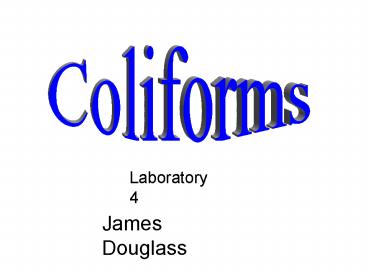Coliforms PowerPoint PPT Presentation
1 / 15
Title: Coliforms
1
Coliforms
Laboratory 4
James Douglass
2
Coliform characteristics
- Aerobic or facultative anaerobic
- Gram-negative, non-spore forming rod
- Major genera Escherichia, Klebsiella
Enterobacter - Able to grow in the presence of bile salts
- FERMENT LACTOSE
- Lactose ? acid gaseous H2 CO2
3
Where are coliforms found?
- Ubiquitous
- Fecal AND non-fecal origins
- Water
- Soil
- Intestinal tract
4
Food quality and acceptability
- Indicator Organism
- Personal hygiene and sanitation
- Presence of coliforms does not mean a food is
hazardous
5
Detection method
- Presumptive (e.g., LST broth, VRB)
- Confirmatory (e.g., BGLB broth)
- Completed (e.g., EMB for probable E. coli)
6
Food Sample (mushrooms, sprouts or tofu)
11g into 99 ml of peptone water (10-1)
Homogenize
1
Prepare decimal dilutions (10-2 , 10-3, 10-4)
Pour plate overlay
MPN (LST Broth)
Plate on E. coli/Col. Petrifilm
Plate on VRB
Do not vortexMPN tubes
Determine presumptive count of VRB and MPN
2
Do not vortex
Inoculate presumptive colonies and tubes to BGLB
Score tubes for coliform count
3
Inoculate coliforms to EMB
4
Inspect EMB plates
7
MPN
1 mL
1 mL
1 mL
- Most Probable Number
- Easier for counting
9 mL
9 mL
9 mL
10-1
10-2
10-3
10-4
1 mL
1 mL
1 mL
-
- - -
LST tubes
3 2 0
8
MPN Enumeration
10-1 10-2 10-3 0.1g 0.01g
0.001g MPN/g 3 2 0
93
Adjustment for dilutions used
Used 10-2, 10-3, 10-4
Final result 930 MPN/g
9
Lauryl Sulfate Tryptose (LST) Broth
- Selective-differential
- Used for coliform detection in water and MPN
determination - Contains
- Lactose to detect lactose fermentation
- Sodium lauryl sulfate a selective agent
- (selects against non-coliforms)
- Tryptose to aid in growth
- NaCl to control osmotic balance
- Durham tubes to detect CO2 formation
10
Violet Red Bile (VRB) Agar
- Selective-differential
- Contains
- Bile salts/crystal violet to select against
- G, non-enteric organisms
- Lactose/neutral red
- Lactose fermenting microorganisms will be
PURPLE-RED (acidic) with halo (coliforms) - Non-lactose fermenting microorganisms will be
YELLOW/STRAW COLORED (basic)
11
E. coli /Coliform petrifilm
- Contains
- VRB gel
- Two dyes-neutral red indicator of
glucuronidase activity - E. coli gt BLUE with gas
bubble - Coliforms gt RED with
gas bubble
12
Brilliant Green Lactose Bile(BGLB) Broth
- Selective-differential
- Confirm the presence of coliforms in food, or
water - Contains
- Oxgall (bile)/brilliant green to inhibit G and
non-coliform G- organisms - Inverted Durham tubes trap CO2 produced by
lactose fermentation
13
Eosin Methylene Blue (EMB) Agar
- Selective-differential
- Detection and differentiation of coliforms
- Contains
- Eosin/methylene blue under acidic conditions,
combine to form a precipitate to differentiate
lactose fermenters from non-lactose fermenters.
They are selective agents, though G and yeasts
may form pinpoint colonies. - Lactose fermenters DARK COLORATION
- Non-lactose fermenters PALE STRAW COLORATION
- Sucrose-fermenters PINK COLOR
- E. coli colonies GREEN SHEEN
14
Coliforms on EMB
15
Not a coliform!

